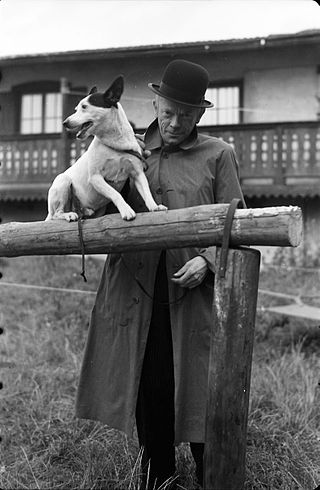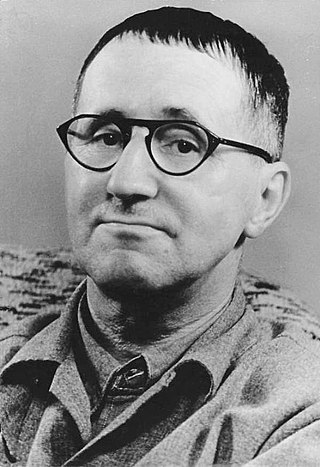See also
- Bertolt-Brecht-Literaturpreis, a German literary award
Bertolt is a German masculine given name, a variant of Berthold, which means "bright leader". Notable people with the given name include:

Hanns Eisler was a German-Austrian composer. He is best known for composing the national anthem of East Germany, for his long artistic association with Bertolt Brecht, and for the scores he wrote for films. The Hochschule für Musik Hanns Eisler Berlin is named after him.

Life of Galileo, also known as Galileo, is a play by the 20th century German dramatist Bertolt Brecht and collaborator Margarete Steffin with incidental music by Hanns Eisler. The play was written in 1938 and received its first theatrical production at the Zurich Schauspielhaus, opening on the 9th of September 1943. This production was directed by Leonard Steckel, with set-design by Teo Otto. The cast included Steckel himself, Karl Paryla and Wolfgang Langhoff.

Drums in the Night is a play by the German playwright Bertolt Brecht. Brecht wrote it between 1919 and 1920, and it received its first theatrical production in 1922. It is in the Expressionist style of Ernst Toller and Georg Kaiser. The play—along with Baal and In the Jungle—won the Kleist Prize for 1922 ; the play was performed all over Germany as a result. Brecht later claimed that he had only written it as a source of income.

Karl Valentin was a Bavarian comedian. He had significant influence on German Weimar culture. Valentin starred in many silent films in the 1920s, and was sometimes called the "Charlie Chaplin of Germany". His work has an essential influence on artists like Bertolt Brecht, Samuel Beckett, Loriot and Helge Schneider.
The Elephant Calf, also known as The Baby Elephant, is an early one-act surrealistic prose farce written by the German modernist playwright Bertolt Brecht. It originally formed the penultimate scene of Brecht's full-length play Man Equals Man, but by 1926 Brecht had separated it to an appendix to the published text. It was performed as part of Man Equals Man that same year. It is an interlude form of play within a play and in a later note Brecht suggests that it is "to be played in the foyer". He has also given it the subtitle "or The provability of any and every contention".
Historicization is commonly referred to the transition of an item from an object of current events to an object of historical interest or to the process of gradual change in perception and interpretation of an object or idea over time.
Mr Puntila and His Man Matti is an epic comedy by the German modernist playwright Bertolt Brecht. It was written in 1940 and first performed in 1948.
The Decision, frequently translated as The Measures Taken, is a Lehrstück and agitprop cantata by the twentieth-century German dramatist Bertolt Brecht. Created in collaboration with composer Hanns Eisler and director Slatan Dudow, it consists of eight sections in prose and unrhymed, free verse, with six major songs. A note to the text by all three collaborators describes it as an "attempt to use a didactic piece to make familiar an attitude of positive intervention."
Round Heads and Pointed Heads is an epic parable play written by the German dramatist Bertolt Brecht, in collaboration with Margarete Steffin, Emil Burri, Elisabeth Hauptmann, and the composer Hanns Eisler. The play's subtitle is Money Calls to Money and its authors describe it as "a tale of horror." The play is a satirical anti-Nazi parable about a fictitious country called Yahoo in which the rulers maintain their control by setting the people with round heads against those with pointed heads, thereby substituting racial relations for their antagonistic class relations. The play is composed of 11 scenes in prose and blank verse and 13 songs. Unlike another of Brecht's plays from this period, The Mother, Round Heads and Pointed Heads was addressed to a wide audience, Brecht suggested, and took account of "purely entertainment considerations." Brecht's notes on the play, written in 1936, contain the earliest theoretical application of his "defamiliarization" principle to his own "non-Aristotelian" drama.
The Tutor is the 1950 Adaptation, by 20th century German dramatist Bertolt Brecht, of an 18th-century play by Lenz. The original Lenz play was produced in 1774 and is also known by the title "The Advantages of a Private Education". Brecht contributed few additions to the plot of the original work, but made many cuts and alterations. Brecht's work is two thirds the length of the original play and over half the material is new. The play was Brecht's first production which featured work from the German Classical Era for the Berliner Ensemble. Overall, it was the third production the Berliner Ensemble performed. Brecht himself directed this production. 'The Tutor' was translated by Ralph Manheim and Wolfgang Sauerlander.
Driving Out a Devil is an early one-act farce by the 20th-century German dramatist Bertolt Brecht. It was written in prose, probably in 1919, and was first published in volume 13 of Brecht's Stücke. The play charts the attempts of a self-confident and manipulative Bavarian peasant boy to outwit the vigilant parents of a girl of his village. Ronald Hayman suggests that this play dramatises most clearly Brecht's own ability to influence people.
Bertolt Brecht was a German poet and playwright.

Let No One Deceive You: Songs of Bertolt Brecht is an album by American folk and blues singer Dave Van Ronk and vocalist Frankie Armstrong, released in 1992. It consists completely of songs by Bertolt Brecht.

Eugen Berthold Friedrich Brecht, known professionally as Bertolt Brecht, was a German theatre practitioner, playwright, and poet. Coming of age during the Weimar Republic, he had his first successes as a playwright in Munich and moved to Berlin in 1924, where he wrote The Threepenny Opera with Elisabeth Hauptmann & Kurt Weill and began a life-long collaboration with the composer Hanns Eisler. Immersed in Marxist thought during this period, he wrote didactic Lehrstücke and became a leading theoretician of epic theatre and the Verfremdungseffekt.

Yılmaz Onay was a Turkish author, theatre director and translator.

"Die Lösung" is a famous satirical German poem by Bertolt Brecht about the East German uprising of 1953. Written in mid-1953, it is critical of the government and was not published at the time. It was first published in 1959 in the West German newspaper Die Welt.
Brecht is both a surname and a masculine given name. Notable people with the name include:

Laureen Nussbaum is a German-born American scholar and writer. She is best known for being a Holocaust survivor, and as a scholar and childhood friend of the famed memoirist Anne Frank. Nussbaum is frequently consulted on Anne Frank works and literature.
The "Einheitsfrontlied" is one of the most famous songs of the German labour movement. It was written by Bertolt Brecht and composed by Hanns Eisler. The best-known rendition was sung by Ernst Busch.
Berthold is a Germanic given name and surname. It is derived from two elements, berht ('bright') and wald. Variants include Berchtold and Bertolt.